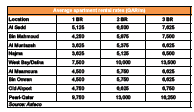Previous Comments
- No comments found

Qatar’s real estate sector has lagged the rest of the economy but there are signs that the property market is poised for a rebound. The International Monetary Fund expects Qatar’s economy to rise 5.2% in 2013, after stellar double-digit growth in previous years. Natural gas drove much of the growth over the past decade as Qatar emerged as the world’s third largest producer of natural gas and the largest exporter of liquefied natural gas. But as natural gas production plateaus, the government is focused on diversifying the economy and investing in the nonhydrocarbons sector.
“As emphasized in the National Development Strategy (NDS) 2011–16, total investments are expected to average 27% of GDP per year during 2012–17, predominantly in the non-hydrocarbon sectors, compared to 31% of GDP per year during the previous five years,” the IMF reported.
Such investments are expected to create financing and investment opportunities for the private sector and have positive spillover effects on the domestic economy, the fund noted.
In addition, Qatar’s successful bid to host the 2022 FIFA World Cup has led to a fresh impetus in the construction and real estate sector. The authorities are hoping the new momentum and investments will absorb excess housing stock that has been an overhang on the sector.
Like other Gulf states, Qatar embarked on a massive real estate development spree prior to the global financial crisis, which led to an oversupply of residential and office space. But there are signs that activity is picking up. “The Qatar market has displayed stability throughout 2012, with the total number of transactions increasing to 7,052 in 2012, an increase of approximately 20%,” noted real estate consultancy Asteco in a recent report on the country’s property market. “The total value of transactions has increased 35% in the same period.”
Data from the Qatar Statistics Authority shows the country’s population rose 7.5% in 2012, mostly due to the influx of expatriate labor. Since 2008, the population has risen nearly 18% as the country’s economy expands. However, the rising population may not absorb all the existing stock of housing units, as there is an oversupply of high-end units, but an acute shortage of affordable housing.
“Satisfying the expected growing demand from a growing expatriate population will ensure that the low-to middle-end segment of the real estate market does not overheat, and will also keep the high-end segment in check,” the IMF notes.
In the office space, rents have remained largely static during the last six months of 2012 as new supply continues to keep rates in check. Vacancy rates have hit 25% in the main West Bay Central Business District area, compared to 14% a year ago.
“There is a significant amount of space in the pipeline for delivery in 2013 and 2014 and at present it is anticipated that new space will be added faster than current absorption levels, which will add further pressure on rents,” said Asteco.
But the banking sector is also being careful in lending to the real estate sector. A quarter of the banks’ credit is exposed to the property market, and the Qatar Central Bank will no doubt be mindful of overexposure to the sector.
“Overall credit to real estate seems to have temporarily stabilized in 2012, but in case there are signs of a renewed pick-up of real estate credit, the QCB agreed to contain it through the use of macro-prudential tools,” said the IM
Add Comment